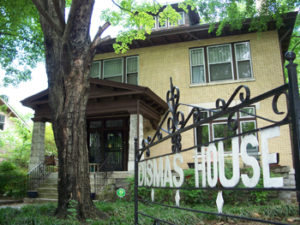Ethnography Summary
Wen-Cong Toh investigated low-income housing options in South Bend as someone who was recently incarcerated would.
Date: 3/5/17 and 3/15/17
Type: Immersion
Location: In the library, making phone calls and using the computers to browse websites and applications.
Housing options investigated:
- South Bend Housing Authority, Public Housing: On the application, it asks if the applicant has a. been evicted from Public Housing before, b. ever been arrested for illegal use of a controlled substance or activities related to the abuse alcohol, c. been convicted or arrested of any criminal activity for the past three years, and d. been charged or convicted of a sexual crime. It was quite an uncomfortable experience filling out the application given those questions, and while they weren’t explicitly discriminatory in saying that answering yes to any of those questions would disqualify an applicant, it definitely felt implied.
- Dismas House: This organization houses former offenders and students in a family setting, and is meant to bring ex-convicts and the community together, in the hopes of a reconciliation. When I called the Dismas House to inquire about a living opportunity, they stated that they are currently full but they can put me on a waitlist. The house also had strict policies such as: each resident must secure and maintain a job, pay service fees of $115 a week, and obey a curfew among other rules (no violence, no use of alcohol/drugs, etc.).


- Prairie Apartments: A very affordable apartment complex in South Bend. When I called to inquire about their openness to housing a formerly incarcerated individual, the secretary told me that a manager would call me back later that week. I was never contacted by them.
- The Upper Room: A sober living environment/community here in South Bend, for men who are recovering from alcohol/drug addiction. While there are many requirements, such as obtaining a 12 step fellowship sponsor, attending AA, providing 5-10 service hours per week, no record of criminal sexual behavior, and a clean drug/alcohol screen when applying, The Upper Room actually seemed like a very good fit for a former offender with drug/alcohol issues. Residents only pay $300 per month, and a social and support system is available 24 hours a day.
- Marmain Apartments: Their website is quite limited so I called to ask about the application process and if they were open to accepting ex-convicts. The man on the phone stated that I would have to come into the office to fill out the application (which brought potential transportation issues to mind), and stated that they had no explicit rules against former offenders, but that it would be a subjective decision by the unit manager. He made it clear that it would be a very subjective decision based on the crime. However, he did not give me any contact information for the unit manager, so I would have had to apply and then probably be interviewed after (about my criminal history).
- A few other apartment complexes that I called had similar responses to Marmain above. It seemed to be a subjective decision by managers and the specific type crime would be weighed heavily.
Top 3 Learnings:
- One constant throughout this process was that basically all of the apartments/landlords/living communities that I contacted would disqualify applicants with a history of sexual crimes, so if that’s on the ex-convict’s record, he basically has no options.
- While there are available housing options for ex-convicts, there is not nearly enough as existing programs lack necessary funding. Both public housing and Dismas house have very long waitlists, and The Upper Room has a waitlist as well. Since those are by far the cheapest options, it leaves an ex-convict with limited options if unemployed.
- The whole process is very vague and ambiguous as many websites are old and not up to date, and when called, you are often referred to a manager who may be very difficult to reach. Finally, if you do end up getting to speak to someone in a position of authority, they always say that it is up to their discretion and that they would have to look into the exact crime that was committed and conduct a thorough background check (politely implying that they would at least be very reluctant to rent to a former offender).
Key Insights – (1) I felt very awkward and embarrassed when contacting these organizations as it was uncomfortable to ask if they would accept ex-convicts. While no one was outwardly dismissive, there was often a shift in the tone after this point was raised. Before I brought up an ex-conviction, many apartment complexes would try to sell me on their amenities and try to get me in for a tour, but once I brought it up, it turned into me having to prove myself and convince them that they should at least give me a chance. (2) At the end of the immersion, I felt extremely discouraged and hopeless as I realized how much rejection I would have to face and overcome if I was really in this position as an ex-convict looking for low-income housing options. It is a very difficult process to undergo on my own so ex-convicts definitely need a lot of support and help in this area.